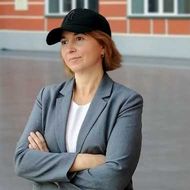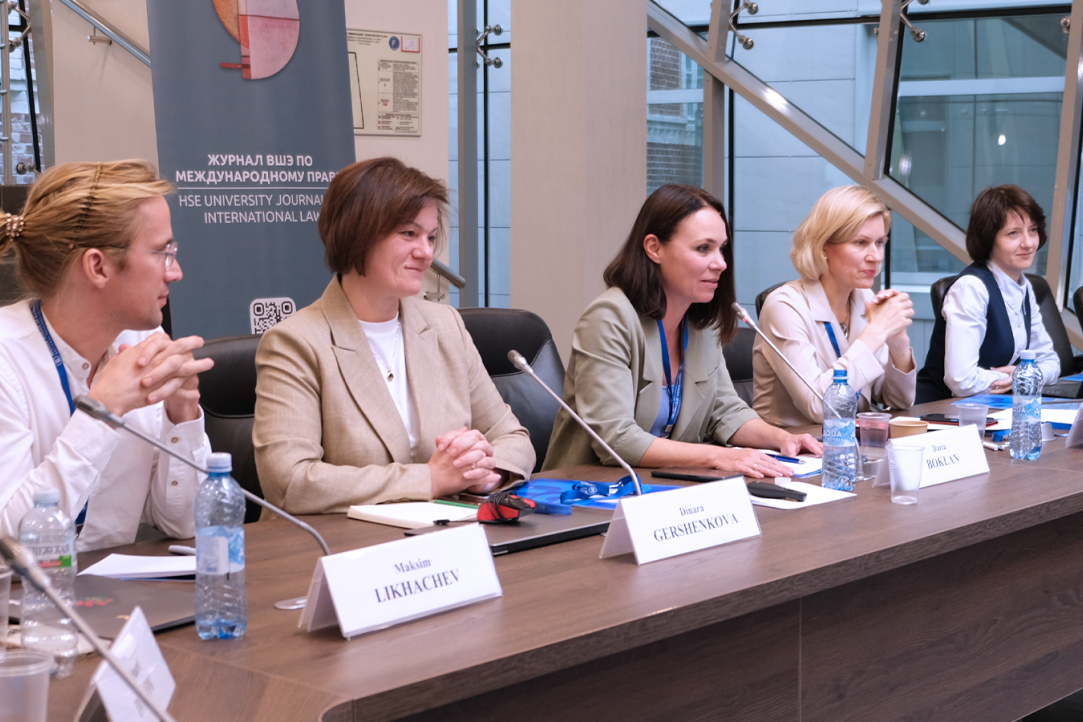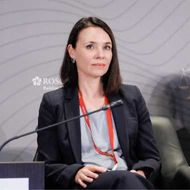- A
- A
- A
- ABC
- ABC
- ABC
- А
- А
- А
- А
- А
- HSE University
- Faculty of Law
- School of International Law
- News
- 'Does Climate Change Law?' - Lawyers and Economists Discussed Topical Issues of the ESG-Agenda
-
School
- About the School
- Research
- Academics
- "HSE University Journal of International Law"
-
Research and Study Laboratories and Groups
-
Research and Study Laboratories
-
Research and Study Groups
-
- Research and Methodology Units
- HSE Research Seminar on International Law
- Ph.D. Seminar
- Undergraduate track ‘International Law’
-
Projects
-
Status: active
- Applied project «Philip C. Jessup international law moot court competition training 2023-2024»
- Applied project 2024-2025 “Preparation for the Willem C. Vis Moot Competition, season 2024-2025”
- Fundamental Research Project "Legal Mechanisms for Overcoming Inequality"
- Participation of Young Lawyers as Clerks of the International Commercial Arbitration Court at the Chamber of Commerce and Industry of the Russian Federation
- Research project: International Competition ‘Dispute Resolution in the EAEU–2024’: Preparation and Participation of the Faculty of Law's Team
-
Status: completed
-
- Staff Members
-
Educational programs
- Bachelor's Programmes
- Master's Programmes
- Doctoral School of Law
Moscow, 3 Bolshoy Trekhsvyatitelsky Pereulok, rooms 227, 228b

E-mail: svetlana.smirnova@hse.ru
Located at a crossroads of global, regional, and national interests, contemporary international law affects almost all spheres of society. The School of International Law keeps pace with significant international events and legal adjudication in order to provide hands-on education that prepares future lawyers and legal scholars for the demands of the current legal landscape. The School is at once a ‘think tank’ that provides expert analysis and a producer of top legal experts and lawyers in international law.
Olga Starshinova, Elena Murashko.
Chinese Journal of International Law. 2025. Vol. 24. No. 3.
In bk.: Sanctions, Business and Human Rights. Clarity Press, 2025. P. 346-366.
 MANDATORY CORPORATE HUMAN RIGHTS DUE DILIGENCE MODELS: SHOOTING BLANKS?
MANDATORY CORPORATE HUMAN RIGHTS DUE DILIGENCE MODELS: SHOOTING BLANKS?
Rusinova V., Sergei K.
Law. LAW. Высшая школа экономики, 2021

'Does Climate Change Law?' - Lawyers and Economists Discussed Topical Issues of the ESG-Agenda

Climate change refers to large-scale long-term changes in average temperature, which is considered one of the three most important planetary boundaries, and a temperature increase of more than 1.5 degrees Celsius is considered a violation of this boundary. Efforts, including legal ones, are being made at different levels: international, national and corporate. At the universal level, three key international treaties have been adopted; at the national level, almost all countries are actively working to implement international norms; and the corporate sector is not lagging behind: the three letters ESG are known to all lawyers. Moreover, international courts - the International Court of Justice, the International Tribunal for the Law of the Sea and the Inter-American Court of Human Rights - are currently considering requests for advisory opinions related to the specification of international legal environmental obligations of states. In the meantime, there is, however, a sense that while 'climate law' continues to develop rapidly, the climate change situation is worsening.
The leitmotif of the scientific conference was a catchphrase with regard to legal means of combating global warming: 'The reality is that yesterday's good enough has become today's unacceptable.' With this quote from the 2023 Hawaii Supreme Court decision on the Honolulu municipality's lawsuit against eight energy companies, Maria Matveeva, Candidate of legal sciences, Deputy Dean for Academic Affairs of the Faculty of Law, and Vera Rusinova, Doctor of legal sciences, Head of the School of International Law, opened the conference.
In four sessions, speakers and conference participants tried to critically rethink the conceptual framework for improving legal regulation of climate change, as well as to exchange experiences on key methodological and theoretical issues of the role of the ESG-agenda in the world.
The presentations made during the first session were devoted to the international legal dimension of combating climate change. Alexander Solntsev, Candidate of legal sciences, Associate Professor, Deputy Head of the Chair of International Law, Faculty of Law, RUDN, in his speech demonstrated the growing importance of the activities of quasi-judicial UN human rights bodies in this area. A number of original ideas on the necessity to change the legal paradigm of attitude to the objects of nature in line with the development of approaches were expressed by Maxim Likhachev, Candidate of legal sciences, Associate Professor of the Chair of International and European Law of the Urals State Law University. Matvey Tarasov, a Postgraduate student of the Graduate School of Law at the Higher School of Economics, shared the results of his research on how environmental standards affect bilateral investment treaties. Thanks to the participation of Ekaterina Makarova, Academic Director of the Environmental Economics and Sustainable Development Master's Programme at the Faculty of World Economy and World Politics, the participants had an opportunity to discuss the concept of 'sustainable consumption'. Elmira Imamkulieva, Academic Director of the Master's Programme 'Socioeconomic and Political Development of Modern Asia', dedicated her report to 'green' Islamic finance and brought a new element to the discussion on ESG-agenda instruments.
The second session was devoted to the implementation of international norms and standards at the national level, the role of national regulators and the problem of 'green washing', moderated by Daria Boklan, Doctor of legal sciences, Professor and Deputy Head of the Department of International Law. The participants were first addressed by foreign speakers. Suresh Nanwani, Professor at the University of Durham (UK), member of the Advisory Board of the 'International Community Law Review', spoke on the correlation of law, ethics and compliance in the fight against global warming. Chamu Kuppuswamy, PhD, Senior Lecturer at Hertfordshire Law School (UK) and Head of Interdisciplinary Research in Global Economics at the Vice Chancellor's Office, spoke about the specifics of implementing international climate commitments in Indian national law. Then two speakers: Dinara Gershenkova, a practitioner with rich experience and a postgraduate student of F.M. Dostoevsky Omsk State University, and Sergey Sitnikov, a partner and head of the ESG practice at the EMPP, revealed the content and problems of Russia's chosen approach to the implementation of these commitments.
The third session of the conference covered the issues of urbanism in the context of the ESG-agenda. In her presentation, Larisa Soldatova, Candidate of legal sciences, Deputy Dean for Extracurricular Activities and Associate Professor at the Department of Public Law highlighted the main principles and trends that determine the integrated and sustainable development of cities. Natalia Vukovich, Associate Professor of the Department of World Economy, Faculty of World Economy and World Politics, Candidate of economic sciences, presented the concept of "smart and sustainable cities", dwelling on the issues of the budgeting process.
The fourth session, moderated by Alexandra Kasatkina, Candidate of legal sciences, Associate Professor at the Department of Legal Regulation of Business and Academic Director of the 'Law' and 'Jurisprudence: Private Law' Bachelor's programmes, was of great interest to the conference participants. This session discussed the issues that make up the corporate dimension of the ESG climate agenda. Using behavioural approaches, Dmitry Tekutyev, PhD, Associate Professor at the Department of Legal Regulation of Business, analysed the biases of management bodies towards ESG and methods to overcome them. His colleague Olga Novikova, PhD, Associate Professor of the Department of Legal Regulation of Business, devoted her speech to the problems companies face in redefining fiduciary duties using ESG principles. Olga Kalashnikova, Ph.D. in Biology, Head of Environmental Management at Severstal, also gave a highly resonant presentation, demonstrating in detail the importance of corporate approaches to ESG implementation in practice.
Summarising the conference, Vera Rusinova expressed her gratitude to the leadership of the Faculty of Law for all-round support of the initiative, noted the fruitful experience of cooperation between the three schools, noting the role of Larisa Soldatova, Alexandra Kasatkina and Daria Boklan in the preparation of this scientific event. Special thanks went to the Faculty of World Economy and World Politics and Ekaterina Makarova, thanks to whom economic expertise was so vividly presented at the conference. Svetlana Smirnova, Roman Abrashin, Victoria Boklan and Sabina Heydarova also provided great assistance in organising the event. As was articulated in the closing remarks, which were based on Greta Thunberg's famous phrase: 'Researchers are never too small to make a difference'.
- About
- About
- Key Figures & Facts
- Sustainability at HSE University
- Faculties & Departments
- International Partnerships
- Faculty & Staff
- HSE Buildings
- HSE University for Persons with Disabilities
- Public Enquiries
- Studies
- Admissions
- Programme Catalogue
- Undergraduate
- Graduate
- Exchange Programmes
- Summer Schools
- Semester in Moscow
- Business Internship
- © HSE University 1993–2025 Contacts Copyright Privacy Policy Site Map
- Edit

